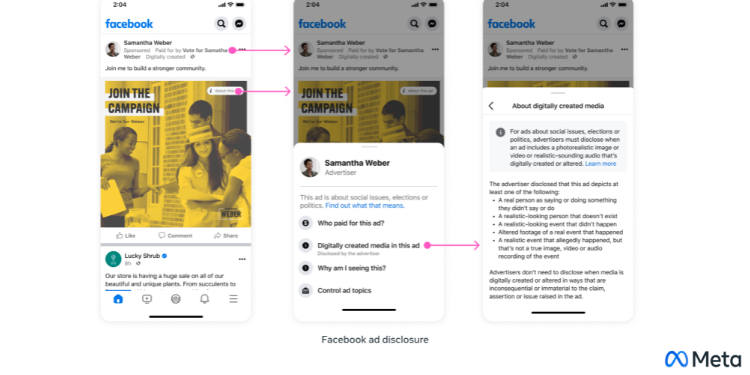Meta has officially put into effect its new disclosure requirements for digitally altered political advertisements. This policy change, which was initially announced in November, mandates that advertisers clearly indicate when their ads concerning social issues, elections, or politics include photorealistic images, videos, or realistic-sounding audio that were digitally created or altered using AI or other methods.
The new policy is designed to enhance transparency and help users understand when AI or digital methods have been employed in creating or modifying political or social issue ads. From Tuesday, January 9 at 10 am PST, advertisers are required to start updating their active ads to comply with this disclosure requirement.
This policy applies globally and is an integral part of Meta’s ongoing effort to ensure honesty and transparency in political advertising on its platforms, such as Facebook and Instagram. The requirement for disclosure is triggered when an ad depicts a real person saying or doing something they did not, creates a realistic-looking person or event that does not exist, or alters footage of real events in a consequential way.
However, Meta specifies that not all digital alterations necessitate disclosure. Minor edits like image resizing, cropping, color correction, or sharpening do not require disclosure unless they are materially significant to the ad’s content or claims.
When advertisers declare in the advertising process that their content is digitally created or altered, Meta will add this information to the ad, which will also be visible in the Ad Library. Advertisers failing to disclose as required face the rejection of their ads, and repeated violations could lead to further penalties.
In line with these new rules, Meta’s independent fact-checkers will continue to review and rate misinformation, including content flagged as “Altered”. Ads rated as False, Altered, Partly False, or Missing Context will not be allowed to run on the platform.
Meta’s implementation of these new disclosure requirements is a significant step towards greater accountability and transparency in digital advertising, particularly in the politically sensitive realms of social issues and elections. For marketers and advertisers, this move emphasizes the importance of ethical practices in digital advertising, ensuring that audiences are accurately informed about the nature of the content they are viewing.




















































